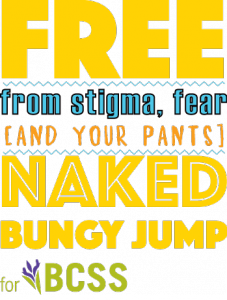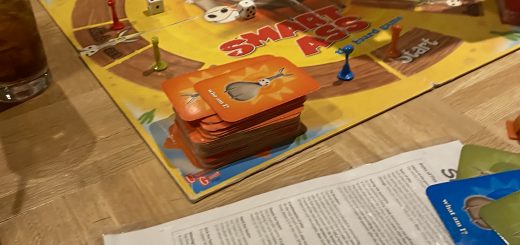Fighting the Stigma of Mental Illness — With a Bungy Jump
 Depressed people are just sad sometimes, schizophrenia immediately turns you into a serial killer and people with Tourette’s syndrome insult everyone all day long — yeah, seems legit. I bet we can convince all of them to just think happier thoughts or simply stop saying these words and then they are going to be fine in a split second.
Depressed people are just sad sometimes, schizophrenia immediately turns you into a serial killer and people with Tourette’s syndrome insult everyone all day long — yeah, seems legit. I bet we can convince all of them to just think happier thoughts or simply stop saying these words and then they are going to be fine in a split second.
Unfortunately, that’s not how it works.
A mental illness can influence a person’s life just as much as a physical one. Maybe it does it in different ways because others often can’t see if a person is in good mental health or not, while the affected can clearly feel it. Therefore it is incredibly important for a society to educate everyone about the seriousness of the issue: People need to know that they are in a comfortable environment to speak up about the invisible problems they have, without being judged or pointed at.
According to the Canadian Medical Association, only half of the population would tell friends or co-workers that they have a family member with a mental illness—while three out of four people would discuss a cancer diagnosis. If this number already is so high, how many people would admit that they themselves are affected? Less than enough. Because those stereotypes are still in place.
An organization that works to fight the stigma of mental illness is the British Columbia Schizophrenia Society (BCSS), who have a branch in Victoria. Even though the word “schizophrenia” is in their name, they want to improve the quality of life for all people affected by mental health issues—directly and indirectly.
That’s why BCSS’ programs not only provide help for people with a mental illness, but also offer support and education for their loved ones or the broader society. They are working on creating this comfortable environment where no one needs to hesitate and hide their problems.
How can you help to fight the stigma?
To make their services accessible for everyone, BCSS offers (most of) their resources for free. This is only possible through the amazing work of volunteers and the generous help of donors. And this is where you come into play: Get involved!
1. As a volunteer: On the BCSS website you can see open volunteer positions that the charity is currently seeking to fill—from social media manager to public presenter. They also ask you to get in contact if you have any special skills that could improve their work.
2. Support their fundraisers: The BCSS organizes several special events during the year to help raise money and awareness. The most popular one might be their annual Naked Bungy Jump, taking place for the 10th time on February 20 and 21, 2016. Yes, it is exactly what you think it is: people voluntarily falling 150 feet off a bridge into the Nanaimo River canyon. Naked. And well, what should I say? I decided to participate.
The charity wants to show that the guts you need to put yourself out there like this are similar to the courage people with mental illnesses have to come up with to seek help. I am thankful that I have people who I can openly talk to about mental issues but I also know of friends who did not feel that way at first. That’s why it is especially important for me to support this initiative. If you feel the same way, you can support the BCSS and my crazy plan through making a donation or even jumping yourself! All proceeds—no matter if fees or donations—go directly towards the BCSS and will help them to keep on doing such good work!
By the way: all(!) donations are going to be matched by a generous anonymous donor and there will be a free shuttle service from Victoria to Nanaimo on Sunday the 21st for participants and guests! What are you waiting for?
3. Educate yourself: Inform yourself about mental illnesses and their consequences for affected people as well as their loved ones. It can literally hit everyone in every social status or position, so it’s better to be prepared. Just being there for somebody because you can see behind the stereotypes can make such a huge difference!
However, what’s most important when talking about this topic: Take care of yourself! We all know how stressful student life can be and how hard it is to take a break between all the deadlines, but listen to your body. If you can’t do it anymore, then don’t. Take a break in between your hours of studying and go for a walk; if you had three midterms in a row, take a mental health day and stay home.
I’m not saying that you should use your mental health as an excuse to procrastinate or skip class, but it should definitely be your first priority. Before you’re reaching for Adderall or other unhealthy stress “management” strategies, try to intervene at an earlier stage. There are some great resources through UVic’s student mental health initiative.
And if you’re looking for a really exciting study break next weekend, remember that there are still spots available to jump or that you can just come up to Nanaimo to watch me and others dangling from a bridge. See you there!




You’re so brave! I don’t know anyone who’s done the naked bungy jump, so I hope to hear how it went.
Thanks!
It was so incredibly terrifying but also satisfying in a strange way. I’m happy I’m alive and able to do stuff like that!